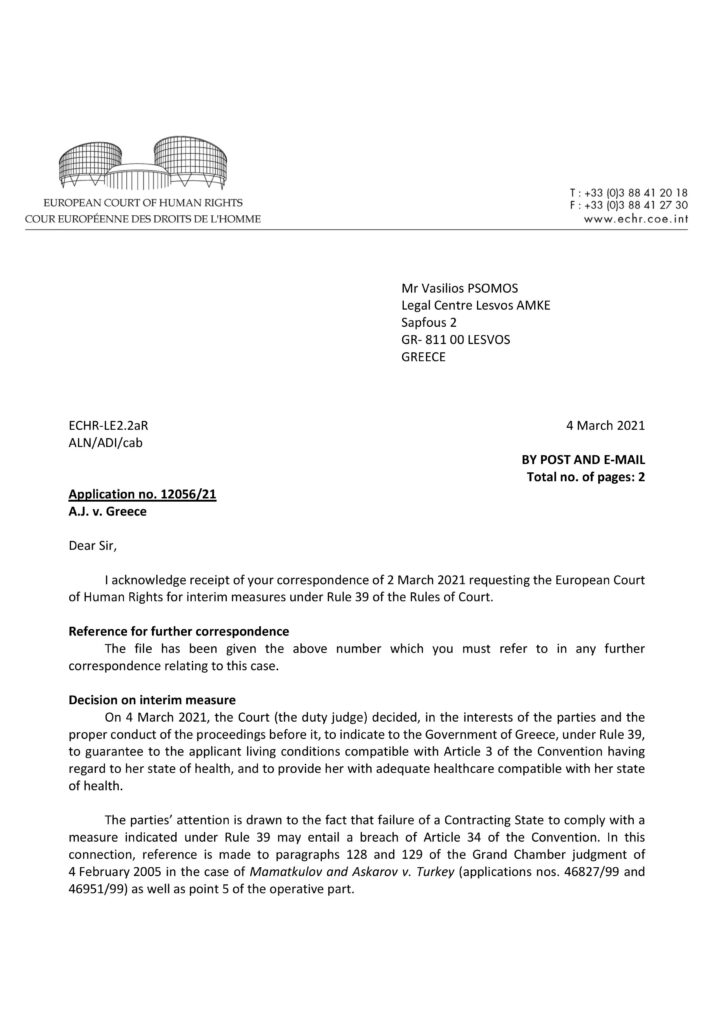
On Tuesday 2 March 2021, the Legal Centre Lesvos submitted an urgent request for interim measures pursuant to Rule 39 of the Rules of the European Court of Human Rights on behalf of A.J., to stop her inhuman and degrading treatment at the hands of the Greek state in violation of Article 3 of the European Convention on Human Rights.
Today, 4 March 2021, the Court granted our request and indicated to the Government of Greece its obligation to guarantee to A.J. living conditions compatible with Article 3 of the Convention having regard to her state of health, and to provide her with adequate healthcare compatible with her state of health.
A.J., is a heavily pregnant woman and a survivor of war, with shrapnel inside her body in multiple locations. She suffers frequent seizures, numbness, immobility and pain as a result. Despite this, A.J. is currently accommodated by the Greek state in Mavrovouni Reception and Identification Centre (RIC) – ‘Moria 2.0’ – in living conditions unfit for human habitation which exacerbate her physical and mental suffering and present an imminent risk of irreparable harm both to her and to her unborn child. A.J. and her family lived in the notorious Moria refugee camp before the fire in September 2020, which left her and her family – including their then 15 month old daughter – in the street for approximately a week, trapped behind police barricades, without food, water, shelter and basic amenities and exposed to tear gas from the police. The inhuman and degrading conditions the family now endure in Moria 2.0 include exposure to lead poisoning, which poses a disproportionate risk to A.J. as a pregnant woman, as well as to the development of her unborn baby and infant child.
Now in her ninth month of pregnancy, A.J. is understandably terrified at the prospect of having to give birth in Moria 2.0 or having to return to live in the camp with her newborn child. Last week, a heavily pregnant woman in Moria 2.0 facing imminent childbirth set herself on fire in desperation at this prospect.
In August 2020, A.J. was referred by the General Hospital in Mytilene for healthcare which cannot be provided in Lesvos. Both UNHCR and the Head of the RIC were aware of A.J.’s medical needs since at least August 2020, yet they systematically failed to transfer A.J. to appropriate accommodation or lift A.J. ‘s geographical restrictions, in violation of their responsibilities to do so for A.J. as a vulnerable person in need of special reception conditions who cannot be provided with appropriate support on the island. Similarly, the Reception and Identification Service (RIS), which since January 2021 has had competency for facilitating transfers to the mainland, has failed to facilitate A.J. ‘s transfer to appropriate accommodation and medical support on the mainland.
It should not require an application to the European Court of Human Rights for the Greek state to comply with its own laws: laws which are already insufficient to secure the conditions of human dignity, self-determination and flourishing that A.J., and everyone subject to Europe’s violent border regime, deserves.
However, in light of today’s decision by the Court, the Greek government must immediately act to:
- Facilitate A.J. and her family’s immediate transfer to the mainland prior to her giving birth.
- Facilitate her access to the healthcare she requires on the mainland.
- Provide A.J. and her family appropriate living conditions in decent housing on the mainland.
